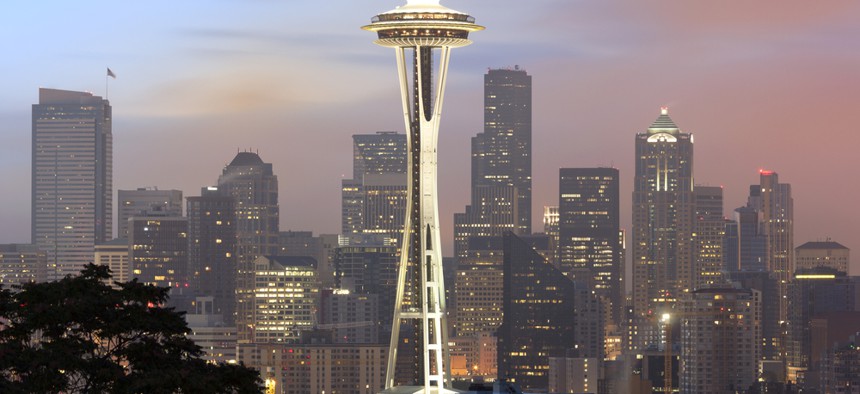Seattle Police Make Public Appeal to Help Tackle a Major Tech Problem

Seattle's police department hopes the public can help it tackle a big tech problem. TinaImages / Shutterstock.com
The department hopes hackers can help it make more than 1 million hours of surveillance video available while balancing privacy and transparency.
The Seattle Police Department is taking an innovative stance in response to a national debate over law enforcement transparency. In addition to recently launching its own body camera pilot program, the SPD is turning to the public for assistance in sharing more than 1 million hours worth of police surveillance video.
On Dec. 19, the SPD will host its first “Hackathon” where members of the public will be able to sort through countless hours (an estimated 364 terabytes of file space) of recorded police video as part of a large-scale effort to bring greater transparency to law-enforcement’s interactions with the community.
From SPD’s announcement:
SPD is working to release more video than ever before, while striking the right balance between transparency and privacy. That’s where you come in. With 1,612,554 videos already on our servers—and more on the way through our upcoming body cam pilot program—our department is looking for a better, faster way redact those videos and make them accessible as public records. We’re looking for a few good hackers who can help.
As GeekWire notes, the SPD is specifically calling on developers to create software that would quickly blur faces, license plate numbers and mute sensitive audio information.
“SPD video specialists must often manually redact or remove faces and voices from those recordings to protect the identities of victims, witnesses, and juveniles,” reads an explanation on the SPD Blotter blog. “A simple redaction in a one minute video can take specialists upwards of half-an-hour, whereas more complicated edits—like blurring multiple faces or pieces of audio—can take much, much longer.”
The response to the hackathon was so overwhelming that the developer reservation spots quickly sold out. The SPD opened up 10 additional reservations, which were also rapidly filled.
The idea for the hackathon came about after an unusual request from one local activist computer programmer.
A report on Crosscut notes that in November, a Seattle area man made a request for nearly every local police agency in the state to make available all departmental video recorded in the field, including in-car, helicopter and body camera footage.
The man, who has chosen to remain anonymous, said he made the request to start a conversation about transparency and police surveillance. “If you don’t like this," he told Crosscut, "get the laws changed.”
In response, the SPD hosted the man for an in-person meeting later that month to discuss ways in which he could more readily access police video.
In exchange, the man agreed to drop his request. That interaction led directly to the SPD requesting the launch of their first hackathon.
The massive video disclosure request creates several issues for state and local police departments. Advocates of body cam programs say they will help bring a new level of accountability to law-enforcement agencies, particularly when dealing with accusations of misconduct.
However, a number of experts and law enforcement officials say they also favor the body cam idea because it simultaneously would offer their officers protection if they are falsely accused of misconduct or are subjected to similar performance related questions.
"The officers that had them said that the interactions they had markedly improved," Bremerton Police Chief Steve Strachan told Crosscut. "They didn't want to give them up. The officers said, 'We like these.'"
However, even if police departments and the public favor greater transparency initiatives, the labor required to upload and process so much video could create a massive burden on local law enforcement agencies already operating on limited budgets. In addition, uploading so much public surveillance raises privacy issues for the public, since the videos could reveal the identities of sexual assault victims, the homes where alleged crimes have been committed and other sensitive information.
One of the organizations calling for restraint in the matter is the American Civil Liberties Union of Washington. ACLU attorney Doug Klunder told Crosscut that video should only be made public in cases surrounding allegations of police misconduct and that most other video should be deleted after a period of about 60 days.
“We want to be transparent, but also make sure we adhere to the public disclosure laws in the State of Washington,” SPD Chief Operating Officer Mike Wagers told GeekWire in an earlier interview.
(Image via TinaImages / Shutterstock.com)





